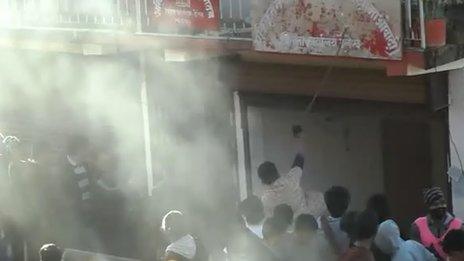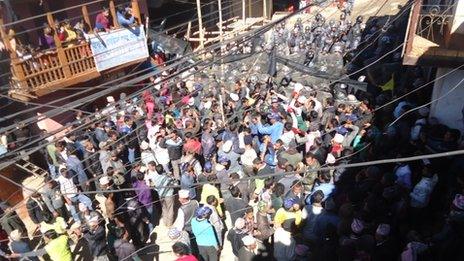Unrest in Nepal over journalist Dekendra Thapa's 2004 murder
- Published

Demonstrators attacked the Maoist party's headquarters in Dailekh
Two senior officials in the western Nepalese district of Dailekh have been transferred, a day after violent protests against a visit by Maoist Prime Minister Baburam Bhattarai.
The protesters are angry over what they say is Mr Bhattarai's obstruction of an investigation into the murder of a journalist in Dailekh in 2004.
Dekendra Thapa was buried alive - allegedly by five Maoist supporters.
Meanwhile a Nepalese colonel accused of torture will face a UK trial in June.
Kumar Lama is alleged to have inflicted severe pain or suffering at the height of Nepal's Maoist insurrection in 2005.
Col Lama was remanded in custody and refused bail. He faces a British trial under a law that allows prosecution of alleged war criminals.
A provisional date for his full trial, which is expected to last between four and six weeks, was set for 5 June at Kingston Crown Court in London.
'Resign immediately'
Nepal's government transferred the chief of the Dailekh district administration and its deputy superintendent of police (DSP) on Thursday.

Dailekh has been the scene of two consecutive days of anti-Maoist protests
Correspondents say it is believed that they are being held responsible for failing to maintain law and order during Mr Bhattarai's visit.
Protesters attacked the Maoist party's headquarters in Dailekh on Wednesday, demanding the prime minister resign immediately and a national unity government be formed. Anti-Maoist demonstrations also took place on a smaller scale in the town on Thursday.
The BBC's Sanjaya Dhakal in Kathmandu says the protesters are especially angry that no-one has been prosecuted for Mr Thapa's death.
Five Maoist supporters have been held in custody since early January in relation to the murder, but none has been charged.
The two main Maoist parties have strongly denied any involvement of their supporters in the killing and have accused opponents of trying to derail the country's peace process by framing the five.
Our correspondent says that while much of the west of Nepal has long been a bedrock of Maoist support, in Dailekh they have always been unpopular, even at the height of Nepal's decade-long civil war which ended in 2006.
Mr Bhattarai has consistently rejected allegations that he has put pressure on anybody in relation to Mr Thapa's case.
He has argued that conflict-era cases should be dealt with by a Truth and Reconciliation Commission - and that allegations of war crimes should not be taken on an individual basis.
Human rights groups say that Mr Thapa, a Radio Nepal journalist, was abducted from his home in June 2004 and was tortured before being buried alive the following August.
More than 16,000 people died in the civil war, with allegations of human rights atrocities made against both the army and Maoist rebels.
Although fighting ended years ago, political stalemate has held up efforts to investigate abuses committed during the war.
- Published5 January 2013
- Published5 January 2013
- Published3 January 2013
- Published1 July 2012